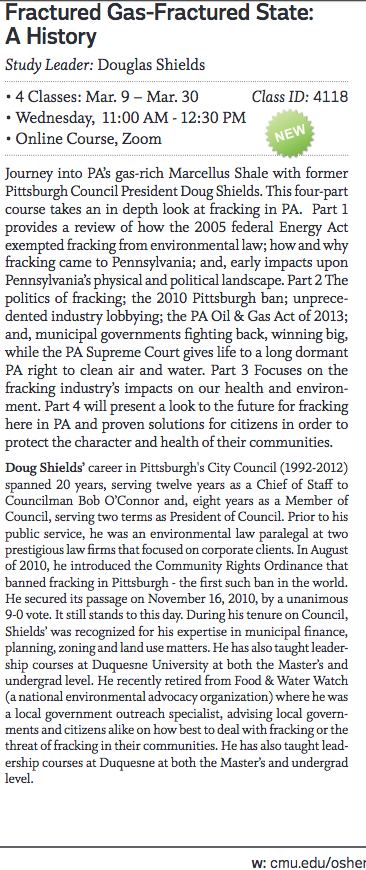Where: CMU’s Osher Lifelong Learning Institute
When: March 9 – 30, 2022, Wednesdays at 11:00 a.m. – 12:30 p.m.
Via Zoom.
Class size limited to 35.
Sign up to reserve your spot.
Part 1 provides a review of how the 2005 federal Energy Act exempted fracking from environmental law; how and why fracking came to Pennsylvania; and, early impacts upon Pennsylvania’s physical and political landscape.
Part 2 The politics of fracking; the 2010 Pittsburgh ban; unprecedented industry lobbying; the PA Oil & Gas Act of 2013; and, municipal governments fighting back, winning big, while the PA Supreme Court gives life to a long dormant PA right to clean air and water.
Part 3 Focuses on the fracking industry’s impacts on our health and environment.
Part 4 will present a look to the future for fracking here in PA and proven solutions for citizens in order to protect the character and health of their communities.
Osher – CMU
https://www.cmu.edu/osher/courses-and-events/index.html
Osher Winter Course Catalogue
https://www.cmu.edu/osher/publications/weekly-essentials/2022/winter/winter-2022_final.pdf


Refer also to:
2012: Pittsburgh Ban on Natural Gas Fracking Faces Challenge from State Authorities
AMY GOODMAN: We’re on the road in Pittsburgh, Pennsylvania, where in 2010, well, Pittsburgh adopted a first-in-the-nation ordinance banning corporations from natural gas drilling in the city. However, state officials now say the ban fails to comply with Pennsylvania law and has encroached on the state’s authority to create environmental regulations. For more, we’re joined by the man responsible for the drilling ban, former Pittsburgh Councilman Doug Shields. Democracy Now! invited the Marcellus Shale Coalition to join us on the show but didn’t get a response.
…
AMY GOODMAN: Why were you so concerned about fracking?
DOUG SHIELDS: Well, it’s inherently dangerous. There’s no environmental impact studies on the part of the state. The state—the institutions of our government failed miserably to do any kind of due diligence, says, “OK, we’re sitting in the middle of the second-largest gas supply in the world. What’s so bad about that?” And that was about the extent of the thinking from the state, no environmental impact studies, no health risk studies. And now I’ve got sick people all over. I’ve got a Department of Health that is not funded to even look into the complaints. I have a book here, Stories from the Shale Fields, where people go on the record. I mean, these are people that are harmed, people that don’t have water, people that have livestock that died.
AMY GOODMAN: And they don’t have water because?
DOUG SHIELDS: It’s contaminated either by methane or other chemicals. Now, the industry, “Well, fracking never did anything.”
“By any responsible account,” Chief Justice Castille wrote, “the exploitation of the Marcellus Shale Formation will produce a detrimental effect on the environment, on the people, their children, and the future generations, and potentially on the public purse, perhaps rivaling the environmental effects of coal extraction.”
2014: VICTORY! Application for reargument denied! Pa. Supreme Court will not reconsider Act 13 decision
2014: Massive Legal Victory in New York State: Towns can ban fracking; New York’s highest court ruled in 27 days Supreme Court of Canada took a year and a day to rule in Ernst vs AER, which was a much less complicated matter on merely a preliminary motion.
